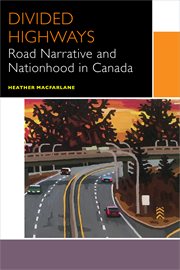Nonfiction
eBook
Details
PUBLISHED
Made available through hoopla
DESCRIPTION
1 online resource
ISBN/ISSN
LANGUAGE
NOTES
This book establishes the existence of a road trip genre in the literatures of Canada. Geography describes the land, and history peoples it, just as memories connect you to place. This is why road trips are such a feature of Anglophone, Qǔbčois and Indigenous writing in Canada, allowing the travelers to claim, at least symbolically, the terrain they have traversed. It is the intersection of history and geography that makes a journey so significant, nourishing a sense of place or revealing the lack of it. Examining the road trips undertaken therefore tells us much about the specific interests of the three general groups at the center of this study. Their desire, and, in some cases, necessity to travel, the traveling companions and destinations they choose, and the histories they create on the land they are covering are indicative of their particular sense of place and nationhood within the country. In order to demonstrate this phenomenon, the book examines works by a variety of Anglophone, Qǔbčois and Indigenous writers, including Gilles Archambault, Jeannette Armstrong, Jill Frayne, Tomson Highway, Linda Hogan, Scott Gardiner, Claude Jasmin, Robert Kroetsch, Lee Maracle, Jacques Poulin, Aritha van Herk and Paul Villeneuve. A comparative approach to literatures in Canada is the logical continuation of postcolonial studies in that it reveals the intricacies and specificities of various communities, contributing to a more complete understanding of multiple national collectivities. It also offers an important counter narrative to transnational studies
Mode of access: World Wide Web







